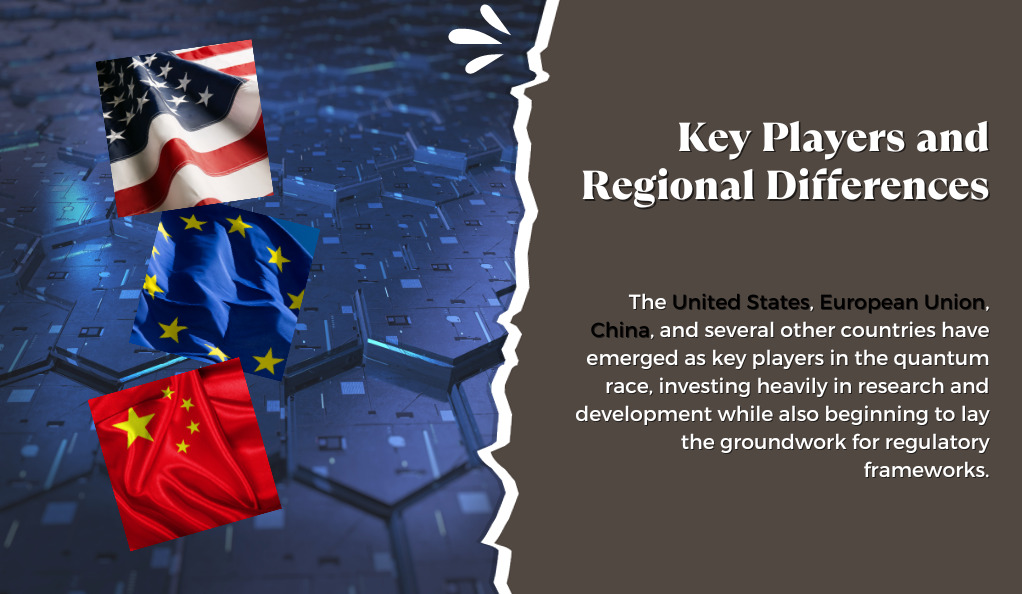In the burgeoning era of technological innovation, quantum technologies are emerging as a transformative force, poised to revolutionize industries ranging from healthcare and finance to cybersecurity and logistics. As we stand on the cusp of this quantum leap, the imperative for comprehensive regulatory frameworks becomes increasingly apparent.
These frameworks are crucial not only for mitigating potential risks and ethical concerns but also for fostering an environment of innovation and public trust. In this article, we delve into the global perspective on quantum technology regulation, exploring the intricate balance between unleashing the potential of quantum technologies and ensuring their safe and ethical development.
Quantum technologies use quantum mechanics principles, with qubits’ unique ability to exist in multiple states at once, offering powerful computation. They hold potential for breakthroughs in material science, drug discovery, and secure communication.
Quantum tech’s early stage raises regulatory challenges due to its dual-use potential. International cooperation is crucial to harmonize regulations and prevent a race to the bottom.
Understanding Quantum Technologies
Quantum technologies harness the unique properties of quantum mechanics, such as superposition, entanglement, and quantum interference, and apply them to create systems that can outperform their classical counterparts in specific tasks. The three main pillars of quantum technologies are quantum computing, quantum communication, and quantum cryptography.
- Quantum computing uses qubits, which can be 0, 1, or both at once (superposition), allowing for rapid processing of multiple possibilities simultaneously. This speeds up tasks like factoring large numbers, simulating quantum systems, and optimizing complex systems.
- Quantum communication involves transmitting quantum states, offering theoretically secure channels immune to eavesdropping due to quantum principles. Quantum Key Distribution (QKD) is a notable application, enabling secure message encryption and decryption through shared random secret keys.
- Quantum cryptography utilizes quantum mechanics for tasks like secure communication, secret sharing, and digital signatures. These applications promise security based on fundamental physics laws, not computational assumptions like classical cryptography.
The Need for Regulation
The rapid advancement of quantum technologies brings forth a plethora of potential benefits, but it also introduces a range of risks and ethical concerns that must be addressed. The dual-use nature of these technologies, where applications can have both beneficial and potentially harmful impacts, necessitates a thoughtful and proactive approach to regulation.
Addressing Potential Risks
Quantum technologies, especially in cryptography, could make current encryption standards obsolete, posing risks to data security and privacy. Advanced quantum computers may break encryption, leading to a “quantum apocalypse” with serious implications for digital communications and data integrity.
Quantum tech in artificial intelligence and optimization may advance rapidly, surpassing our ability to understand and manage risks. Quantum algorithms in machine learning could create highly capable systems, raising concerns about autonomy, bias, and technology misuse.
Fostering Innovation and Public Trust
- Encouraging Innovation and Investment: Clear and predictable regulatory frameworks foster an environment conducive to innovation and investment in quantum technologies, protecting businesses and researchers.
- Building Public Trust: Regulation is critical in establishing and maintaining public trust in quantum technologies, ensuring their ethical and responsible use.
- Prioritizing Transparency: Regulatory frameworks should prioritize transparency, accountability, and the protection of individual rights to build and maintain trust in quantum tech.
Transformative Potential Across Industries
The transformative potential of quantum technologies spans a wide range of industries, from healthcare and finance to logistics and manufacturing. In healthcare, quantum computing could lead to more efficient drug discovery processes and personalized medicine. In finance, quantum algorithms could optimize trading strategies and risk management. In logistics, quantum technologies could enhance optimization algorithms, leading to more efficient supply chains.
Global Regulatory Landscape
The development and deployment of quantum technologies are not confined by national borders, necessitating a global perspective on regulatory frameworks. Countries around the world are recognizing the strategic importance of quantum technologies, leading to a flurry of activity in developing policies and regulations to govern their use.
Key Players and Regional Differences

The United States, European Union, China, and several other countries have emerged as key players in the quantum race, investing heavily in research and development while also beginning to lay the groundwork for regulatory frameworks.
- United States: The U.S. leads in quantum research with government funding, but regulation is in its early stages, focusing on innovation-security-ethics balance.
- European Union: The EU collaboratively promotes quantum tech through programs like Quantum Flagship. Robust data protection rules will likely extend to ensure high security and privacy for quantum technologies.
- China: China advances in quantum communication and cryptography, with government support. Regulatory frameworks are developing and expected to influence the global landscape.
| Topic | Description |
|---|---|
| Regulatory Frameworks | Complex task with challenges due to rapid technological advancements and quantum mechanics uncertainties. |
| Opportunity | A unique chance to shape quantum technology’s future for maximum benefits and risk mitigation. |
| Strategies | Proactive and adaptive regulatory approaches, informed by deep understanding of quantum tech and its apps. |
| Navigating Uncharted Territory | Quantum technology’s transformation requires effective regulation to ensure responsible development. |
Challenges and Opportunities in Regulation
Navigating the regulatory landscape for quantum technologies is a delicate balancing act, requiring a nuanced understanding of both the technical complexities and the potential societal impacts of these emerging technologies.
Complexity and Rapid Evolution
- Inherent Complexity: Quantum tech is intricate and rapidly evolving, posing difficulties in crafting effective and adaptable regulations.
- Technical Intricacies: Quantum mechanics’ complexities demand a deep understanding and forward-thinking regulatory approach.
- Uncertainties and Unknowns: Regulators must anticipate future developments without overly prescriptive rules that could hinder innovation.
- Ongoing Engagement: Collaboration with scientists, industry experts, and stakeholders is vital to stay updated and ground regulations in technology’s understanding.
Balancing Innovation and Security
One of the central challenges in regulating quantum technologies is striking the right balance between fostering innovation and ensuring security and ethical standards. Quantum technologies have the potential to drive significant economic and societal benefits, but they also pose new security risks, particularly in the realm of cryptography and secure communication.
The prospect of quantum computers breaking current encryption standards necessitates a proactive approach to quantum-safe cryptography, ensuring that data is protected both now and in the future. At the same time, regulators must be careful not to impose overly burdensome requirements that could hinder innovation and slow down the development of quantum technologies.
Ethical Considerations and Societal Impacts
- Ethical Concerns: The use of quantum algorithms in AI and machine learning can create highly capable systems, raising questions about autonomy, bias, and accountability.
- Societal Impacts: Regulators must address broader societal implications, ensuring equitable distribution of benefits and mitigation of potential harms.
- Holistic Regulation: A comprehensive approach to regulation is needed, considering both technical aspects and societal impacts of quantum technologies.
Opportunities for International Collaboration
The global nature of quantum research and development presents unique opportunities for international collaboration in the development of regulatory frameworks. Harmonizing regulations across borders can help to create a level playing field, preventing regulatory arbitrage and ensuring that quantum technologies are developed and deployed in a safe and ethical manner.
The Future of Quantum Technology Regulation
As we venture further into the era of quantum technologies, the need for robust and adaptive regulatory frameworks becomes increasingly clear. The future of quantum technology regulation will be shaped by ongoing technological advancements, the evolving global landscape, and the collective efforts of governments, industry, and academia.
Anticipating Technological Advancements
The rapid pace of innovation in quantum technologies necessitates a forward-looking approach to regulation. Policymakers and regulators must stay informed about the latest developments in the field, anticipating potential breakthroughs and their implications for security, privacy, and ethical standards.
This requires ongoing engagement with the scientific community, industry experts, and other stakeholders, ensuring that regulatory frameworks are grounded in a deep understanding of the technology and its potential applications. It also necessitates a flexible and adaptable approach to regulation, capable of evolving in tandem with the technology.
The Role of Governments
Governments play a crucial role in shaping the future of quantum technology regulation. They are responsible for setting policy directions, funding research and development, and establishing regulatory frameworks that balance innovation with security and ethical considerations.
In addition to their domestic responsibilities, governments also have a role to play in fostering international collaboration and coordination. By engaging in dialogue and cooperation at the global level, they can help to harmonize regulatory approaches, share best practices, and address common challenges.
Industry and Academia as Key Stakeholders

The industry and academia are also key stakeholders in the future of quantum technology regulation. They are at the forefront of research and development, driving innovation and pushing the boundaries of what is possible.
As such, they have a vested interest in the development of regulatory frameworks that support innovation while ensuring the responsible use of quantum technologies. They can contribute valuable insights and expertise to the regulatory process, helping to shape frameworks that are both effective and conducive to innovation.
Proactive and Adaptive Regulatory Strategies
The future of quantum technology regulation requires proactive and adaptive regulatory strategies, capable of navigating the complexities of this rapidly evolving field. This includes anticipating potential risks and ethical concerns, fostering an environment that encourages innovation and investment, and ensuring that the benefits of quantum technologies are realized in a safe and responsible manner.
Conclusion
In the world of quantum technologies, great potential and challenges await. To navigate this new frontier, we need flexible regulations that balance innovation, security, and ethics. With collaboration across sectors, we can responsibly harness quantum tech for societal advancement. Together, we shape a secure, transformative future.




